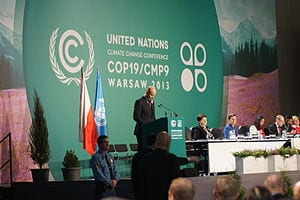There’s a distinct lack of optimism here at the Warsaw climate meeting. A recent report from UNEP shows that we are falling far short of the emissions reductions necessary to limit the global temperature increase to no more than 2°C above pre-industrial levels. The IPCC working group 1 report points out the grave implications of our rising carbon emissions. But, like the previous reports, IEA’s World Energy Outlook released Monday shows that, despite the grim emissions trends, we do still have choices: yes, we can cut our emissions sharply and, yes, that means making serious policy decisions now.
Seven Takeaways from the IEA report
Here are seven important takeaways from the IEA report relevant for the climate negotiations:
- What happens in the energy sector is crucial to our climate future. The sector is responsible for two-thirds of global warming emissions currently, and without significant policy action annual energy-related CO2 emissions will rise by 20% to 37.2 gigatonnes (Gt) by 2035, meaning that we would be headed for a long-term average temperature increase of 3.6 °C.
- Policy decisions that countries make right now can make a tremendous difference in how much more carbon we emit. This includes support for renewable energy and energy efficiency and removal of subsidies to fossil fuel producers.
- The energy sector is in tremendous flux globally with a lot of new capacity (mainly in China and India) and replacement capacity (mainly as old power plants are retired in the U.S. and Europe) being added. This creates an opportunity to make low carbon choices; taking full advantage of that opportunity is critical to meeting climate goals.
- Natural gas use will likely expand globally under a business as usual scenario. (But, as a recent UCS report points out, an overreliance on natural gas comes with significant climate risks.)
- The IEA says that under a business as usual scenario, renewable energy will grow significantly, from 20% of electricity generation in 2011 to 31% in 2035, approaching coal as a leading source of power. But this would still mean growing emissions from the power sector (an increase of between 13 to 15 Gt in that timeframe), leaving its share constant at about 40% of global emissions. NREL’s recent 80% by 2050 renewable energy report and the IPCC special report on renewable energy shows we can be much more aggressive in cost-effective renewables deployment both in the U.S. and globally.
- The power sector has several affordable low-carbon alternatives available already, including wind and solar energy, and electricity demand is growing rapidly. Therefore policies that encourage renewable electricity and energy efficiency are particularly vital to bending the emissions curve globally.
- Globally, nearly 1.3 billion people still lack access to electricity and 2.6 billion still depend on traditional biomass for energy (with grave health and pollution consequences). Global climate talks have to address this fundamental inequity, even as they negotiate a pathway to lower global emissions.
Opportunities for the U.S.
Here in the U.S. we have an incredible opportunity to make deep cuts in our power sector emissions. Uneconomic coal-fired power plants are being retired at record levels and renewable energy costs are declining sharply every year. There’s no doubt we can capitalize on this momentum through strong policies, including power plant carbon standards, renewable electricity standards and soon, one hopes, through a national price on carbon. Putting a strong target for emissions reductions on the table shouldn’t be a stretch for the U.S. And that would have a very significant effect on raising the level of ambition of a global climate agreement.
A chance to snatch opportunity in the face of despair
“Setting expectations” is a game everyone seems to play at the UNFCCC climate talks. No one wants to seem naïve about what’s possible here at Warsaw. After all, we are in the coal capital of Europe at a conference backed by fossil-heavy corporate sponsors. And bizarrely the Polish government has chosen to have the International Coal and Climate Summit simultaneously in Warsaw during the UNFCCC meeting. (Seriously, you couldn’t make this stuff up!)
But yesterday we all had a moment of heart-wrenching clarity. As Yeb Saño, the lead negotiator from the Philippines, so powerfully reminded us: “If not us, then who? If not now, then when? If not here in Warsaw, where?”










